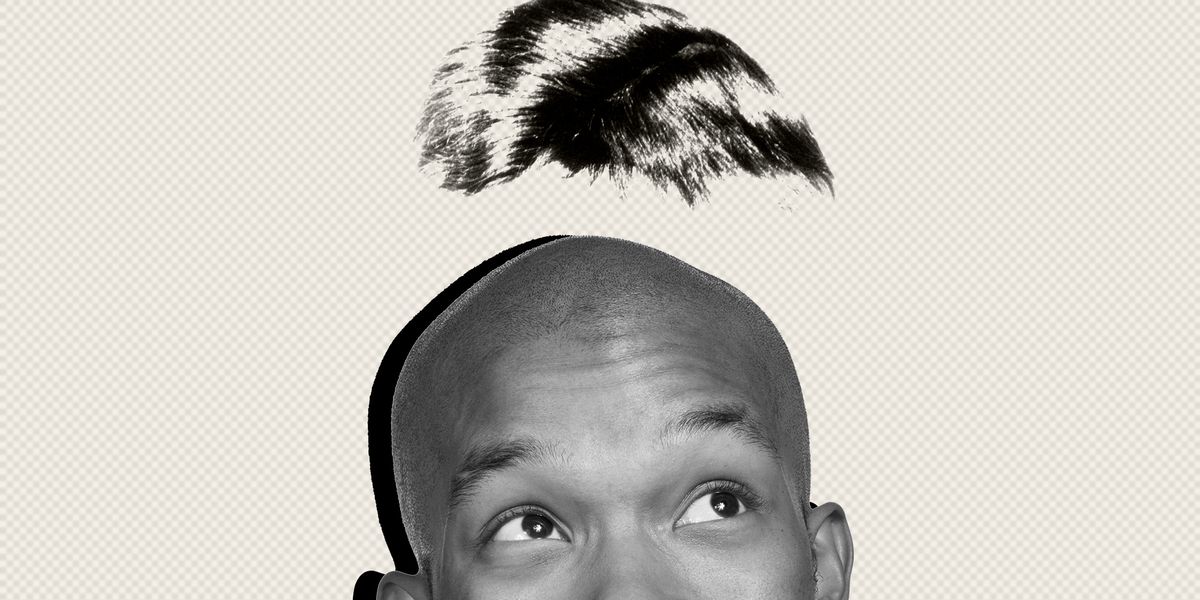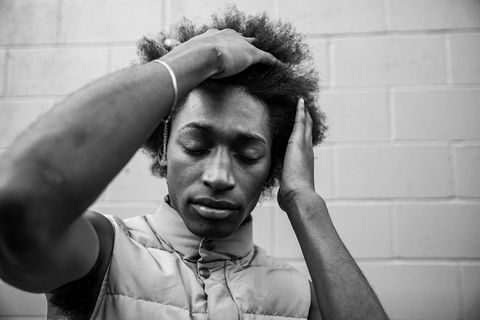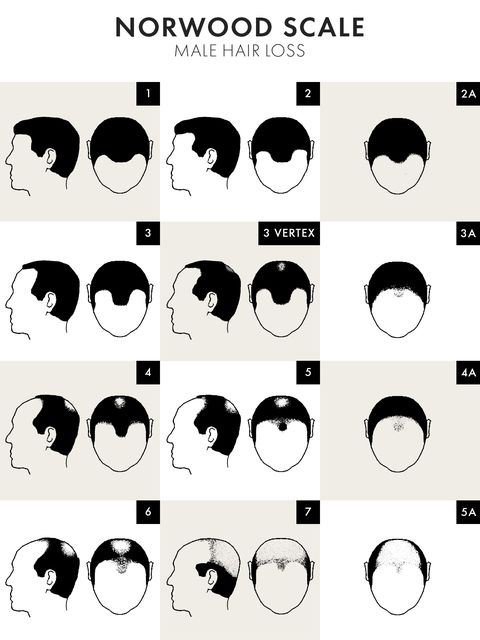Welcome. You’re here; you made it. Rest assured, this is a safe space. It’s a journey, from that first day you feel a tad less volume when running a hand through his hair to now, this point, when you finally type that fated question into Google.
Fortunately, you’ve come to the right place. We’ve been waiting for you, ready and armed with a dream team of experts to bring you a complete guide on balding: what it is, what can be done, and how to discuss it with your beau (or girlfriend, or non-binary partner; but, let’s face it, it’s mostly men who bald—after all, there’s a reason the hereditary condition androgenetic alopecia is known as male pattern baldness).
Meet Craig Ziering, a dermatologist, hair transplant surgeon, and owner of Ziering Medical; Firat Siksik, a trichologist at Sanamentum; Maya Maria Brown, a relationship expert at Coupleness; Stephen Marinaro of TheSalonGuy on TikTok and YouTube; and lastly, Gregorio Ruggeri, hair stylist, trichologist, and owner of New York’s Salon Ruggeri.
Before we dive in, take comfort. About half of all men deal with progressive baldness by age 40, so he’s certainly not alone.
“There are more options today than even a decade ago to help younger patients slow down their hair loss, strengthen their existing hair, and even regrow some of what has been lost,” says Ziering. Hold on to hope.
Here, find answers to all your burning questions about how to deal with your BF’s balding.
He had a full head of hair when we met. What happened?
Early balding is typically due to the aforementioned androgenetic alopecia. It can begin to present itself as early as adolescence, and the cause, Siksik says, is a genetic sensitivity to a byproduct of testosterone, dihydrotestosterone (DHT), that causes hair follicles to shrink. This is the most common culprit, accounting for up to 90 percent of early balding cases, per Ziering.
The term “pattern baldness” is drawn from the fact most people with the condition will find their hairline recedes in a common pattern. You might notice that many men have the “‘M’-shaped loss starting with the widow’s peaks, as well as thinning at the crown,” Ziering explains of the universal pattern. As such, the Norwood scale, ranging from mild to severe, is often used to identify the specific stage of loss.
Despite these commonalities, “no two balding patients, timeline, or processes are exactly the same,” he clarifies. “There can even be variance in twins.” Why’s that? While pattern baldness might be an umbrella term for the condition, it manifests differently person-to-person, because several genes are involved. This “genetic cocktail,” as Ziering calls it, determines the rate, frequency, and pattern of loss in each person. As they say, each snowflake is unique.
However, there are other conditions, like lupus, that can cause hair loss. So, if your man’s balding is a real head-scratcher, he might want to mention it to a doctor, just in case it’s signaling something else that requires treatment.
Can it be reversed? What are the best treatment options?
Reversed—no, not really. If it’s in his genetics, it’s inevitable. But treatment can still make a difference, that is, if that’s what you want.
“There is a significant window of time between onset and becoming bald, and that’s when having the hair conversation is key, and early intervention with preventative therapies should begin,” Ziering says.
The most effective path is to target the root of the problem: by blocking that aforementioned DHT, according to Siksik.
“I would advise to start with medications,” he says. Pharmaceuticals finasteride and minoxidil can stimulate regrowth in some cases and are available in many OTC and prescription formats.
“Topical minoxidil is available without a prescription and is the most common treatment used,” says Siksik. “Apply it to your scalp twice a day. Some men respond better than others, but it can take up to six months to see results.” Another tip Siksik suggests is looking for products that contain 1 to 2 percent ketoconazole, a drug that stops testosterone from converting to DHT.
Alternatively, Ziering recommends meeting with a hair loss expert as your first step, as doctors and specialists can assess the stage of thinning and advise on the best customized action plans for the short- and long-term.
In regards to products, Ziering recommends opting for medical-grade or prescription treatments rather than over-the-counter aids. His other suggested options include low-level laser therapy, as well as the medications he’s formulated himself, like ZMin, which contains minoxidil, retinoic acid, and “a sophisticated blend of anti-inflammatory, antioxidant, and anti-androgen ingredients,” he explains.
Other patients may benefit from hormone replacement or from KeraLase, a laser treatment which is clinically proven to be effective and is said to be pain-free.
For those who are open to the idea of surgery, hair transplants are the most long-lasting and effective form of treatment, albeit the most expensive and invasive as well.
“Surgical hair restoration is the only permanent solution for hair loss; it is the only treatment in which the hair that is programmed to last for life is moved to balding and thinning areas on the scalp,” Ziering says. “FUE [Folicular Unit Extraction] and MDEE [strip harvest procedures] are innovative, surgical hair harvesting methods used to obtain donor hair either by strip or one graft at a time,” he explains, with the stipulation that these procedures require highly skilled experts.
Transplants do provide the most natural-looking results and can take between five and six hours under local anesthesia, according to Siksik.
My boyfriend isn’t balding—yet. Can we do anything to prevent it from starting?
There are no guarantees, of course, but there are actionable steps to help keep his hair as healthy as possible for as long as possible. First up: diet. Siksik recommends fostering a diet high in healthy proteins like omega-3 fatty acids. He can also incorporate a few specific vitamins, including vitamin D, zinc, and iron.
Lastly, it might be time to overhaul his medicine cabinet. “Examine your hair products. Avoid excessive use of hair gels and try natural styling products which contain less harsh chemicals,” says Siksik, who also recommends products with 1 to 2 percent ketoconazole.
Most of the advertisements I see look like scams. How do I know what’s legit?
“The main thing to remember is that there is no miracle cure,” says Siksik. “Don’t buy into any product and treatment that will give instant results or promise that it prevents balding, as it is ultimately down to genetics and your body.”
Avoid puffed-up slogans and claims, hair loss brushes, or vibrating headgear.
“FDA-approved, dermatology recommended, or restoration surgeon or specialist sanctioned products, procedures, or programs are the only way to go,” Ziering says. “Don’t waste your money on lotions, potions, and pills that over-promise and under deliver.”
His hair is a sensitive subject. How can I bring it up without offending him?
Bear in mind that hair loss can have serious implications on a person’s self-image, so you should treat the conversation with care until you can gauge how he really feels about it.
“Hair loss, particularly at a young age, can be debilitating and takes an emotional toll on patients and partners alike,” Ziering says. The physical change can have mental and emotional ripples, even triggering anti-social disorders, stress, depression, and anxiety among some men.
If you’re seeing the signs, he probably is, too. Chances are you aren’t breaking the news to him. Compassion is key, and so is honesty. He may be concerned that you won’t be attracted to him as his hair thins, so assure him otherwise from the start.
“Men and women who have hair loss start their day with a lot of angst about how to hide their hair loss from others, unless they have decided to accept it,” Ziering says. “Much energy goes into the daily managing of combing their hair this way and that, trying to disguise or camouflage the thinning areas.”
That said, he might feel completely fine about it. His feelings might not be that deep, and that’s cool, too. Maybe he’s down to be bald, try something new, or even shave his head. “If you present the topic as a grave, serious, emotional subject, he might feel that his baldness is a big deal and something to be ashamed of,” Brown says.
“When you start the conversation, rather than steering it into the depths of complex emotions, leave the floor open for him to let you know his mindset,” she continues. “Even if he’s feeling fine about it, if you seem to expect him to feel a certain way, that could lead to him feeling self-conscious. Instead, try saying something like, “I wanted to check in to see how you’re feeling about your hair these days. I think you’re super hot and want to make sure you still feel that way.”
Be mindful of when and where you choose to bring it up. The Thanksgiving dinner table at your aunt’s house? Bad idea. During the big game or when he’s trying to catch up on House of the Dragon? Not great. Take into consideration his mood at the time, how his day went, or what’s on his schedule. You might want to preface it by asking if it’s a good time to chat about something that might make him feel vulnerable. You’ll know if the time is right—just don’t force the conversation or crudely inject it into pillow talk.
I’m not sure how I feel his new look…am I an awful person if I tell him I don’t like it?
Before you think about starting a conversation with him, Brown recommends checking in with yourself. Do you know how he feels about it? Are you wondering if he plans to do anything about it?
“Spend some time processing how you feel about his balding,” Brown says. “It’s perfectly understandable to have your own reaction, as you would with any change in appearance.” There’s no right or wrong gut reaction, and you aren’t shallow for feeling bummed. There is, however, a wrong way to react, so keep yourself in check.
“You can journal, or go for a walk to consider things like if it’s affecting your attraction to him, if it just takes time to get used to, or if you have any other feelings coming up,” Brown suggests. “Then you can decide what, if anything, you want to share with him about how you feel.” Especially if you think you’ll come around to his new look over time, consider holding off on saying anything that can’t be unsaid, lest you do real emotional damage.
If you are struggling with your attraction to him, don’t panic and hit the ripcord just yet. He’ll probably be able to tell if you lie about it, so don’t do that either. “If he asks directly, you can acknowledge that it’s a change, and you’re getting used to it the same way he is,” Brown suggests.
I don’t mind his bald spot at all! How can I help him to not feel self-conscious about it?
Remind him that nobody cares as much as he feels like they do. As long as he can be happy and confident, that’s what matters. (Honestly, who among us couldn’t stand to hear this more often?)
“Ensure he knows that you don’t care about how he looks, only about how balding is making him feel,” Siksik recommends. In what might come as a surprise, Siksik adds that it usually doesn’t help to reference your favorite bald celebrities, no matter how hot you think Bruce Willis is, or how convinced you are that Harry Styles is wearing a wig.
If he is struggling with the issue, ask how you can support him best. Let him know that you’re here to listen. Offer to help research options (congrats, you’re clearly ahead of the curve), call for consultations, and go to appointments with him. If he starts using a specialized haircare regimen, familiarize yourself with his new routine and ask if he wants you to take progress pictures to track results.
“Help him manage some of the rituals or circumstances with a smile,” Ziering says. Don’t jeer at his LED cap, encourage his friends to not make jokes, and put the kibosh on any toupee-related gag gifts.
Meg Donohue is the Associate Fashion Commerce Editor at ELLE.com. Her passions include spicy foods, sustainability, and the Y2K remake of Charlie’s Angels. She will never stop hoping for a One Direction reunion tour.




